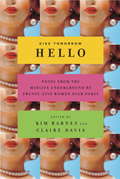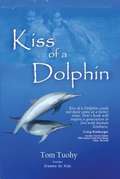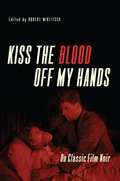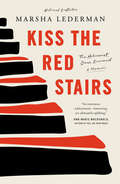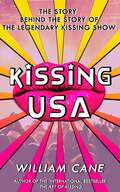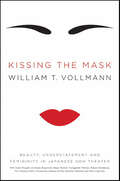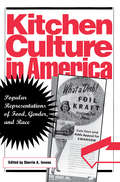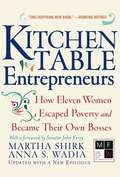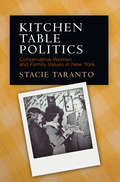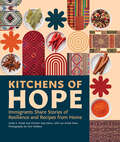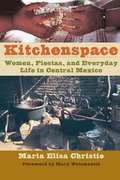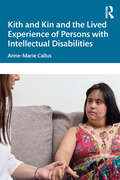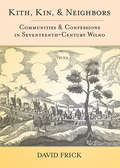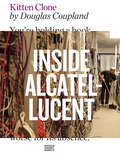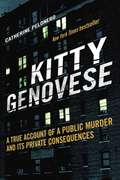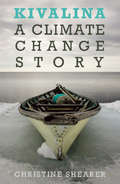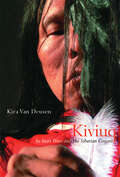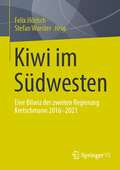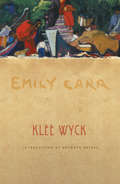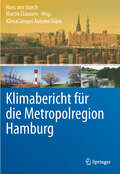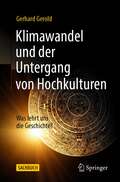- Table View
- List View
Kiss My Math: Showing Pre-Algebra Who's Boss
by Danica MckellarKiss My Math will help math-phobic teenagers everywhere chill out about math, and finally negative numbers, variables, absolute values, exponents, and more. Each chapter features: Step-by-step instruction, time-saving tips and tricks, illuminating practice problems with detailed solutions etc.
Kiss Tomorrow Hello: Notes From the Midlife Underground by Twenty-Five Women Over Forty
by Claire Davis Kim BarnesA collection of blazingly honest, smart, and often humorous essays on middle age contributed by well-known writers such as Julia Glass, Joyce Maynard, Lolly Winston, Antonya Nelson, Diana Abu-Jaber, Judy Blunt, Lauren Slater, and other voices of the baby boom generation.In the tradition of the bestselling A Bitch in the House, Kiss Tomorrow Hello brings together the experiences and reflections of women as they embark on a new stage of life. Many women in their forties, fifties, and sixties discover that they are racing uphill, trying desperately to keep their romantic and social lives afloat just as those things they believe constant start to shift: The body begins its inevitable decline, sometimes gracefully, sometimes less so...The twenty-five stellar writers gathered here explore a wide range of concerns, including keeping love (and sex) alive, discovering family secrets, negotiating the demands of illness and infertility, letting children go, making peace with parents, and contemplating plastic surgery. The tales are true, the confessions candid, and the humor infectious--just what you'd expect from the women whose works represent the best writings of their generation. From Lynn Freed's wry "Happy Birthday to Me" to Pam Houston's hilarious "Coffee Dates with a Beefcake"; from Ellen Sussman's "Tearing Up the Sheets" to Julia Glass's "I Have a Crush on Ted Geisel," Kiss Tomorrow Hello is a wise, lyrical, and sexy look at the pleasures and perils of midlife.
Kiss of a Dolphin
by Tom TuohyThis quote by John Kemp is taken from the first page of Kiss of a Dolphin and sums up the essence of the book: ... "Tom Tuohy's book does what I have been working to accomplish my entire life. Not only is it a pleasure to read, but reminds us all that kids can face so many disabling conditions on their way to growing up -- that poverty is no less immobilizing than conditions brought about by illness or accident. In a single work, it embodies so many of the ideals that the civil rights and advocacy movements of all types have been striving for throughout the past fifty years. It is a story about courage and fear. Many people fear those with disabilities: perhaps it is self-consciousness and a desire to not say or do the wrong thing. Not only do the people at Dreams for Kids appear to have no worries about doing the wrong thing, they seem to have adopted the "can do" attitude so necessary to positive change. And, they give everyone a place to start: the book encourages readers to look at the person in the wheelchair or with a cane, to get past any fear or self-consciousness, and start by saying "Hi." I love this book. I love it because Tom and his friends understand, at the deepest possible level, that everyone is disabled, at some time, in some way. It is clear the barriers Dreams for Kids remove have less to do with adaptive equipment than with the opportunity they give people to see themselves in a different way. And, it is equally clear that these opportunities are at least as valuable for the volunteers, as they are for the recipients."
Kiss the Blood Off My Hands: On Classic Film Noir
by Robert MiklitschConsider the usual view of film noir: endless rainy nights populated by down-at-the-heel boxers, writers, and private eyes stumbling toward inescapable doom while stalked by crooked cops and cheating wives in a neon-lit urban jungle. But a new generation of writers is pushing aside the fog of cigarette smoke surrounding classic noir scholarship. In Kiss the Blood Off My Hands: On Classic Film Noir, Robert Miklitsch curates a bold collection of essays that reassesses the genre's iconic style, history, and themes. Contributors analyze the oft-overlooked female detective and little-examined aspects of filmmaking like love songs and radio aesthetics, discuss the significance of the producer and women's pulp fiction, as well as investigate Disney noir and the Fifties heist film, B-movie back projection and blacklisted British directors. At the same time the writers' collective reconsideration unwinds the impact of hot-button topics like race and gender, history and sexuality, technology and transnationality. As bracing as a stiff drink, Kiss the Blood Off My Hands writes the future of noir scholarship in lipstick and chalk lines for film fans and scholars alike.
Kiss the Red Stairs: The Holocaust, Once Removed
by Marsha LedermanFor readers of All Things Consoled by Elizabeth Hay and They Left Us Everything by Plum Johnson, Kiss the Red Stairs is a compelling memoir by award-winning journalist Marsha Lederman delves into her parents&’ Holocaust stories in the wake of her own divorce, investigating how trauma migrates through generations with empathy, humour, and resilience.Marsha was five when a simple question led to a horrifying answer. Sitting in her kitchen, she asked her mother why she didn&’t have any grandparents. Her mother told her the truth: the Holocaust.Decades later, her parents dead and herself a mother to a young son, Marsha begins to wonder how much history has shaped her own life. Reeling in the wake of a divorce, she craves her parents&’ help. But in their absence, she is gripped by a need to understand the trauma they suffered, and she begins her own journey into the past to tell her family&’s stories of loss and resilience.Kiss the Red Stairs is a compelling memoir of Holocaust survival, intergenerational trauma, divorce, and discovery that will guide readers through several lifetimes of monumental change.
Kissing USA: The Story Behind the Story of The Legendary Kissing Show
by William CaneCollege. For many, it is a place of learning, self-discovery, and growth. But as much as parents don't want to admit it, college is also a time of unabashed exploration, especially for the MTV-drenched and Howard Stern Radio Show-soaked kids of the 1990s. So, it makes perfect sense that The Kissing Show, a performance based on the international bestseller The Art of Kissing, became a near-overnight sensation.Born out of William Cane's Judd Apatow-like desire to woo the woman of his dreams, The Kissing Show appeared at over 400 colleges and universities across the nation.Kissing U.S.A. reveals it all in a sexy (and sometimes shocking) behind-the-scenes look at all the things that were part of making the The Kissing Show a sensation:The comedic and surprising foibles of Cane's own love lifeThe power of listening to and understanding your audienceDealing with competition from drag queensThe importance of having a "less-than-ideal" museThe fact that almost anything can be a source of inspiration--if spun the right wayJoin Cane as he recounts his meteoric rise in the college lecture and entertainment circuit through all the good, the bad, and the awkward kisses that took North American colleges by storm. Who knew playing dentist could ever be a turn-on?
Kissing the Mask: Beauty, Understatement and Femininity in Japanese Noh Theater
by William T. Vollmann“Intrepid journalist and novelist William T. Vollman’s colossal body of work stands unsurpassed for its range, moral imperative, and artistry.”—BooklistWilliam T. Vollmann, the National Book Award–winning author of Europe Central, offers a charming, evocative, and piercing examination of the ancient Japanese tradition of Noh theatre and the keys it holds to our modern understanding of beauty. Kissing the Mask is the first major book on Nohby an American writer since the 1916 publication the classic study Pisan Cantos and the Noh by Ezra Pound. But Kissing the Mask is pure Vollman—illustrated with photos by the author with provocative related side-discussions on femininity, transgender, kabuki, pornography, geishas, and more.
Kit Carson's Long Walk and Other True Tales of Old San Diego
by Henry Schwartz13 tales from the city of San Diego, California in the 1800s.
Kitchen Culture in America
by Sherrie A. InnessAt supermarkets across the nation, customers waiting in line--mostly female--flip through magazines displayed at the checkout stand. What we find on those magazine racks are countless images of food and, in particular, women: moms preparing lunch for the team, college roommates baking together, working women whipping up a meal in under an hour, dieters happy to find a lowfat ice cream that tastes great. In everything from billboards and product packaging to cooking shows, movies, and even sex guides, food has a presence that conveys powerful gender-coded messages that shape our society.Kitchen Culture in America is a collection of essays that examine how women's roles have been shaped by the principles and practice of consuming and preparing food. Exploring popular representations of food and gender in American society from 1895 to 1970, these essays argue that kitchen culture accomplishes more than just passing down cooking skills and well-loved recipes from generation to generation. Kitchen culture instructs women about how to behave like "correctly" gendered beings. One chapter reveals how juvenile cookbooks, a popular genre for over a century, have taught boys and girls not only the basics of cooking, but also the fine distinctions between their expected roles as grown men and women. Several essays illuminate the ways in which food manufacturers have used gender imagery to define women first and foremost as consumers. Other essays, informed by current debates in the field of material culture, investigate how certain commodities like candy, which in the early twentieth century was advertised primarily as a feminine pleasure, have been culturally constructed. The book also takes a look at the complex relationships among food, gender, class, and race or ethnicity-as represented, for example, in the popular Southern black Mammy figure. In all of the essays, Kitchen Culture in America seeks to show how food serves as a marker of identity in American society.
Kitchen Table Entrepreneurs: How Eleven Women Escaped Poverty and Became Their Own Bosses
by Martha Shirk Anna S. WadiaOver the last five years, the number of women-owned businesses has grown at twice the rate of all U. S. firms; in the next few years, the number is expected to surpass the six million mark. Kitchen Table Entrepreneurs tells the inspirational stories of eleven low-income women who have marshaled the creative energy, confidence, and capital necessary to start their own small businesses. These women, who have used their entrepreneurial skills as a route out of poverty, give an American face to an economic empowerment tool that has enjoyed great success in developing countries. By becoming their own bosses, they not only provide for their children but also inspire them. Though each of their businesses is unique, all eleven of these women have discovered previously unknown strengths as they've struggled to overcome personal and bureaucratic obstacles. All received important assistance from nonprofit organizations supported by the Ms. Foundation for Women, the pioneer funding entity of microenterprise programs in the United States. Updated with a new epilogue.
Kitchen Table Politics: Conservative Women and Family Values in New York (Politics and Culture in Modern America)
by Stacie TarantoMost histories of modern American politics tell a similar story: that the Sunbelt, with its business friendly environment, right-to-work laws, and fierce spirit of frontier individualism, provided the seedbed for popular conservatism. Stacie Taranto challenges this narrative by positioning New York State as a central battleground. In 1970, under the governorship of Republican Nelson Rockefeller, New York became one of the first states to legalize abortion. By 1980, however, conservative, antifeminist Republicans with broad suburban appeal—symbolized by figures such as Ronald Reagan—had usurped power from these so-called Rockefeller Republicans. What happened during the intervening decade?In Kitchen Table Politics, Taranto investigates the role that middle-class, mostly Catholic women played both in the development of conservatism in New York State and in the national shift toward a conservative politics of "family values." Far from Albany, a short train ride away from the feminist activity in New York City, white, Catholic homemakers on Long Island and in surrounding suburban counties saw the legalization of abortion in the state in 1970 as a threat to their hard-won version of the American dream. Borrowing tactics from church groups and parent-teacher associations, these women created the New York State Right to Life Party and organized against several feminist initiatives, including defeating an effort to add an Equal Rights Amendment to the state constitution in 1975.These self-described "average housewives," Taranto argues, were more than just conservative shock troops; instead, they were inventing a new, politically viable conservatism centered on the heterosexual traditional nuclear family that the GOP's right wing used to broaden its electoral base. Figures such as activist Phyllis Schlafly, New York senator Al D'Amato, and presidential hopeful Ronald Reagan viewed the Right to Life Party's activism as offering a viable model to defeat feminist initiatives and win family values votes nationwide. Taranto gathers archival evidence and oral histories to piece together the story of these homemakers, whose grassroots organizing would shape the course of modern American conservatism.
Kitchens of Hope: Immigrants Share Stories of Resilience and Recipes from Home
by Lee Svitak Dean Linda S. Svitak Christin Jaye EatonCulinary journeys from around the globe: recipes and stories from immigrants to the United States Immigrants carry more than hope as they cross oceans and traverse continents to come to the United States. They hold tightly to stories and recipes, remembrances of what they left behind. Kitchens of Hope brings together these memories from contributors who hail from more than thirty countries, offering a glimpse into their kitchens and insight into their lives. This book is a celebration of people and cuisines from around the world, infused with the aromas of epazote and cardamom, the tang of fish sauce, the heat of chile peppers, and the bite of mustard greens. With tales as compelling as the brimming bowls and overflowing platters of these foods that represent home, Kitchens of Hope features immigrants coming from vastly varied circumstances. Some arrived in the United States fleeing war and violence, others were seeking education and opportunity; some have called the United States home for years, and others have only recently arrived. Despite the differing situations that brought them here, the contributors all find comfort and tradition as they gather to share meals with family and friends. They are activists and entrepreneurs, parents and community leaders, and some are affiliated with the Minnesota-based nonprofit the Advocates for Human Rights, the organization that inspired the creation of this book. Structured around the contributors&’ personal stories of their journeys, the chapters reflect the main themes connecting them: community, resilience, opportunity, justice, hope, and celebration. In these pages, readers will find inspiration, along with more than fifty recipes, from curry, mole, biryani, and borscht, to pita, pho, sambusa, pupusas, and so much more. Welcome to the Kitchens of Hope table.
Kitchenspace
by Maria Elisa ChristieThroughout the world, the kitchen is the heart of family and community life. Yet, while everyone has a story to tell about their grandmother's kitchen, the myriad activities that go on in this usually female world are often devalued, and little scholarly attention has been paid to this crucial space in which family, gender, and community relations are forged and maintained. To give the kitchen the prominence and respect it merits, Maria Elisa Christie here offers a pioneering ethnography of kitchenspace in three central Mexican communities, Xochimilco, Ocotepec, and Tetecala. Christie coined the term "kitchenspace" to encompass both the inside kitchen area in which everyday meals for the family are made and the larger outside cooking area in which elaborate meals for community fiestas are prepared by many women working together. She explores how both kinds of meal preparation create bonds among family and community members. In particular, she shows how women's work in preparing food for fiestas gives women status in their communities and creates social networks of reciprocal obligation. In a culture rigidly stratified by gender, Christie concludes, kitchenspace gives women a source of power and a place in which to transmit the traditions and beliefs of older generations through quasi-sacramental food rites.
Kith and Kin and the Lived Experience of Persons with Intellectual Disabilities
by Anne-Marie CallusThis book considers the ways in which the lives of persons with intellectual disability are closely interconnected with those of the persons around them. The ways in which these interconnections work and the effects they have are examined by taking a very close look at specific instances in the lives of persons with intellectual disability, taken from published research and other sources and covering various life domains, including education, employment, creative work, socialising and family life. The fourteen case-study chapters (covering Australia, France, Ireland, Italy, Malta, Spain, the UK, and the USA) focus on the interactions between the person with intellectual disability concerned and other persons. The analyses use Paul Ricoeur’s concept of the interrelational self to show how the lives and selves of persons with intellectual disability are intimately intertwined with those of the persons who come into contact with them. Furthermore, it is argued that what we learn about the deep connections between persons with intellectual disability and those who play a significant role in their lives can be applied to general human experience. What happens in each one-to-one interaction is of paramount importance. The analyses are based on Max Van Manen’s phenomenonological research approach and critical phenomenology. The innovative approach thus created provides fresh insights and a different method for carrying out research and analysis in the area.The short format of the chapters in the main part of the book makes it suitable for use on a wide range of courses in disability studies as well as in other disciplines and areas of study, such as psychology, education, legal studies and childhood studies among others. It also makes it accessible for advocates and practitioners working with persons with intellectual disability.
Kith, Kin, and Neighbors: Communities and Confessions in Seventeenth-Century Wilno
by David FrickIn the mid-seventeenth century, Wilno (Vilnius), the second capital of the Polish-Lithuanian Commonwealth, was home to Poles, Lithuanians, Germans, Ruthenians, Jews, and Tatars, who worshiped in Catholic, Uniate, Orthodox, Calvinist, and Lutheran churches, one synagogue, and one mosque. Visitors regularly commented on the relatively peaceful coexistence of this bewildering array of peoples, languages, and faiths. In Kith, Kin, and Neighbors, David Frick shows how Wilno's inhabitants navigated and negotiated these differences in their public and private lives.This remarkable book opens with a walk through the streets of Wilno, offering a look over the royal quartermaster's shoulder as he made his survey of the city's intramural houses in preparation for King Wladyslaw IV's visit in 1636. These surveys (Lustrations) provide concise descriptions of each house within the city walls that, in concert with court and church records, enable Frick to accurately discern Wilno's neighborhoods and human networks, ascertain the extent to which such networks were bounded confessionally and culturally, determine when citizens crossed these boundaries, and conclude which kinds of cross-confessional constellations were more likely than others. These maps provide the backdrops against which the dramas of Wilno lives played out: birth, baptism, education, marriage, separation or divorce, guild membership, poor relief, and death and funeral practices. Perhaps the most complete reconstruction ever written of life in an early modern European city, Kith, Kin, and Neighbors sets a new standard for urban history and for work on the religious and communal life of Eastern Europe.
Kitten Clone
by Douglas CouplandDouglas Coupland, one of the world's biggest cultural brains, takes an inside look at the global company that keeps us connected, and wonders what all that connectivity is doing to our brains and our sense of ourselves as humans. The incomparable Douglas Coupland reports from inside the corporate offices and science labs of Alcatel-Lucent, a globally influential business whose work is largely unknown to consumers. "Were it to vanish tomorrow," he writes, "our modern world would grind to a halt. The Internet would implode--your Internet would implode." Although his examination of the company is playful and fascinating in its own right, Coupland's account is driven by his thoughtful reflections on the larger cultural and sociological significance of the transformative information technology Alcatel works on: fiber wire, microprocessors, the Internet and mobile technologies. And by a larger meditation about what the Internet is doing to us as it relentlessly colonizes the planet, and our brains. Like Coupland's best work, Kitten Clone is a wildly entertaining yet penetrating encounter with the technological and cultural forces that surround us. And also a surprising and unique exploration of a possible future.From the Trade Paperback edition.
Kitty Genovese: A True Account of a Public Murder and Its Private Consequences
by Catherine PeloneroA New York Times bestseller!Written in a flowing narrative style, Kitty Genovese: A True Account of a Public Murder and Its Private Consequences presents the story of the horrific and infamous murder of Kitty Genovese, a young woman stalked and stabbed on the street where she lived in Queens, New York, in 1964. The case sparked national outrage when the New York Times revealed that dozens of witnesses had seen or heard the attacks on Kitty Genovese and her struggle to reach safety but had failed to come to her aid-or even call police until after the killer had fled.This book, first published in 2014 and now with a new afterword, cuts through misinformation and conjecture to present a definitive portrait of the crime, the aftermath, and the people involved. Based on six years of research, Catherine Pelonero’s book presents the facts from police reports, archival material, court documents, and firsthand interviews. Pelonero offers a personal look at Kitty Genovese, an ambitious young woman viciously struck down in the prime of her life; Winston Moseley, the killer who led a double life as a responsible family-man by day and a deadly predator by night; the consequences for a community condemned; and others touched by the tragedy.Beyond just a true-crime story, the book embodies much larger themes: the phenomenon of bystander inaction, the evolution of a serial killer, and the fears and injustices spawned by the stark prejudices of an era, many of which linger to this day.
Kivalina: A Climate Change Story
by Christine ShearerThe true story of an Alaska Native village destroyed by flooding and erosion caused by climate change—and how they fought for help.Warming Arctic temperatures have been making coastal areas of Alaska increasingly uninhabitable. In 2008, the small Alaska Native village of Kivalina filed a legal claim against some of the world’s largest fossil fuel companies for damaging their homeland and creating a false debate around climate change. Academic and former journalist Christine Shearer explores the history leading up to the lawsuit, its connections to disaster management and adaptation, and its relationship to past misinformation campaigns involving lead, asbestos, and tobacco. Kivalina’s struggle for safe relocation, the book argues, is part of our common struggle to acknowledge and address climate change before it is too late.2012 Rachel Carson Environment Book Award (Honorable Mention)Praise for Kivalina“Moving, infuriating, ominous . . . . Shearer provides an impressively concise and comprehensive history of the growth of corporate power in America; its influence on, entwinement with, and corruption of government; [and] corporate obfuscation of industrial hazards.” —Publisher’s Weekly“Best book of 2011: one of the most timely and important books to be published in 2011—and in the past decade.” —Jeff Biggers, The Huffington Post“In novelistic detail, Shearer recounts the science, politics, legal battles, and human experience at one of the leading edges of climate change impact. In doing so, she . . . tells the story not just of one village in Alaska, but of us all.” —The Society of Environmental Journalists
Kiviuq
by Kira Van DeusenAfter decades exploring Siberian cultures, Kira Van Deusen turned to the Canadian north to ask many such questions, looking at them through the versions of one of their most respected legends - that of hero/shaman Kiviuq, an Inuit counterpart to Homer's Odysseus - told by forty Inuit elders. The elders' voices engage us directly, inviting us to look at the unique qualities of arctic heroism and its application to present-day concerns. Rich details from each of the elders' families help explain interpersonal challenges to survival in the north and offer both practical and spiritual lessons. Van Deusen also points out intriguing cultural connections across the Bering Strait, past and present.
Kiviuq: An Inuit Hero and His Siberian Cousins (McGill-Queen's Indigenous and Northern Studies #54)
by Kira Van DeusenAfter decades exploring Siberian cultures, Kira Van Deusen turned to the Canadian north to ask many such questions, looking at them through the versions of one of their most respected legends - that of hero/shaman Kiviuq, an Inuit counterpart to Homer's Odysseus - told by forty Inuit elders. The elders' voices engage us directly, inviting us to look at the unique qualities of arctic heroism and its application to present-day concerns. Rich details from each of the elders' families help explain interpersonal challenges to survival in the north and offer both practical and spiritual lessons. Van Deusen also points out intriguing cultural connections across the Bering Strait, past and present.
Kiwi im Südwesten: Eine Bilanz der zweiten Regierung Kretschmann 2016-2021
by Felix Hörisch Stefan WursterNach der ersten grün-roten Landesregierung in einem deutschen Bundesland von 2011 bis 2016 in Baden-Württemberg führte Winfried Kretschmann von 2016 bis 2021 zum zweiten Mal eine grün-geführte Landesregierung an – eine lagerübergreifend grün-schwarze Kiwi-Koalition. Auch diese Regierungskonstellation ist bislang in der deutschen Geschichte einmalig. Der Sammelband analysiert, wie sich dieser Regierungswechsel von Grün-Rot zur selbst ernannten grün-schwarzen Komplementärkoalition in den verschiedenen Politikfeldern auf die durchgesetzten Policies ausgewirkt hat. Neben dem expliziten Vergleich der durchgeführten Reformen in den beiden Legislaturperioden beleuchten einzelne Kapitel des Sammelbands beispielsweise auch die Koalitionsbildungsprozesse, die Bürgerbeteiligung und den Einfluss organisierter Interessen unter der zweiten Landesregierung Kretschmann sowie die Verschiebungen im Parteiensystem in Baden-Württemberg.
Klee Wyck
by Emily Carr Kathryn BridgeDouglas & McIntyre is proud to announce definitive, completely redesigned editions of Emily Carr's seven enduring classic books. <P><P>These are beautifully crafted keepsake editions of the literary world of Emily Carr, each with an introduction by a distinguished Canadian writer or authority on Emily Carr and her work.Emily Carr's first book, published in 1941, was titled Klee Wyck ("Laughing One"), in honour of the name that the Native people of the west coast gave to her. This collection of twenty-one word sketches about Native people describes her visits and travels as she painted their totem poles and villages. Vital and direct, aware and poignant, it is as well regarded today as when it was first published in 1941 to instant and wide acclaim, winning the Governor General's Award for Non-fiction. In print ever since, it has been read and loved by several generations of Canadians, and has also been translated into French and Japanese.Kathryn Bridge, who, as an archivist, has long been well acquainted with the work of Emily Carr, has written an absorbing introduction that places Klee Wyck and Emily Carr in historical and literary context and provides interesting new information.
Kleiner Kanon großer Filme
by Stefan Neuhaus Michael BraunWas macht einen Film groß? Für Truffaut war es niemals das ‚Runde‘ oder ‚Perfekte‘, Peter Hamm ergänzte, dass das Vergnügen des Kritikers oft da anfange, wo das der anderen aufhöre, bei Stilbrüchen etwa oder Exzessen. Was sind überhaupt Gründe dafür, bestimmte Filme besonders sehenswert zu finden? Die von Literatur-, Film- und Kulturwissenschaftler:innen geschriebenen Beiträge dieses Bands präsentieren je einen Film und begründen ausführlich, weshalb gerade er zu den größten der Geschichte gehört. Die Auswahl ist weder exklusiv noch elitär, sie regt zum Nachdenken an, weshalb uns auch Filme jenseits des Blockbuster-Kinos und der gängigen Kanonlisten in den Bann schlagen. Inmitten bekannter Klassiker von Lang, Chaplin, Hitchcock & Co. und jüngerer Meisterwerke von Haneke, Almodóvar und Sofia Coppola gibt es manchen Geheimtipp zu entdecken.
Klimabericht für die Metropolregion Hamburg
by Hans Von Storch Martin ClaussenDer Sachstandsbericht liefert einen Überblick über das wissenschaftlich gesicherte Wissen zu Klima, Klimavariabilität und Klimawandel in der Region Hamburg. Dabei beschreiben die Autoren sowohl das Wissen über die letzten 100 Jahre als auch über mögliche Veränderungen in den kommenden 100 Jahren. Es wird dargestellt, auf welchen Feldern Übereinstimmung besteht, wo Uneinigkeit oder Unwissen herrschen und wo Forschungsbedarf besteht. Der Bericht wurde im Rahmen des Exzellenzclusters CliSAP am KlimaCampus der Universität Hamburg erarbeitet.
Klimawandel und der Untergang von Hochkulturen: Was lehrt uns die Geschichte?
by Gerhard GeroldGlobale Klimaveränderung und Klimakollaps sind in Medien und Gesellschaft ein inzwischen viel beachtetes Thema geworden. Der Zusammenbruch alter Hochkulturen wird dabei in Verbindung mit plötzlichen Klimaveränderungen gebracht. Anhand neuester Forschungsergebnisse gibt das Buch Antworten auf die Rolle von Klimaveränderung für den Kollaps alter Hochkulturen zu unterschiedlichen Zeiten und Kontinenten – von Mesopotamien bis nach Grönland. Dabei erfolgt eine Zusammenschau von archäologischen und paläoklimatischen Erkenntnissen unter Berücksichtigung der damaligen ökonomischen, politischen und religiös-kulturellen Verhältnisse. Der Geograph Gerhard Gerold legt mit diesem Buch eine detaillierte Analyse der schon in historischer Zeit bestehenden komplexen Vernetzung kulturgeschichtlicher und umweltökologischer Bedingungen vor, die für unsere heutige globalisierte Welt eine große Aktualität besitzen. Das Buch bietet zahlreiche Beispiele für den Vergleich damaliger und heutiger Umweltkrisen. Der Autor: Gerhard Gerold gehört als Mitglied der Nationalen Akademie der Wissenschaften Leopoldina zu den Wissenschaftlern, die sich schon seit den 80er Jahren mit Themen der Umweltzerstörung in den Tropen beschäftigt haben. Der Zusammenbruch früher Hochkulturen in Verbindung mit regionalen Klimaänderungen faszinierten ihn im Rahmen seiner umfangreichen geoökologischen Forschungsarbeiten.

